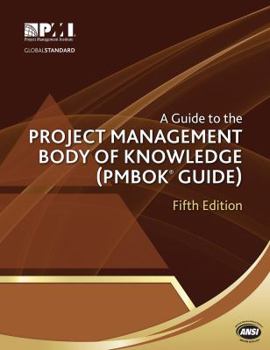A Guide to the Project Management Body of Knowledge (Pmbok(r) Guide)-Fifth Edition
Select Format
Select Condition 
Book Overview
A Guide to the Project Management Body of Knowledge (PMBOK(R) Guide) is the go-to resource for project management practitioners. Reflecting this evolution, The Standard for Project Management... This description may be from another edition of this product.
Format:Paperback
Language:English
ISBN:1935589679
ISBN13:9781935589679
Release Date:January 2013
Publisher:Project Management Institute
Length:589 Pages
Weight:3.08 lbs.
Dimensions:1.3" x 8.4" x 10.8"
Customer Reviews
4 ratings
John Blakely PMP on the PMBOK
Published by Thriftbooks.com User , 18 years ago
I have been a project manager most of my life but generally under different names than project manager. The facts that I learned and more are captured in the PMBOK. In fact, this book dissects the knowledge of project management in several ways so that it can be fitted to all companies and industries. The guide to the body of knowledge is a wonderful road map to project management. It doesn't contain all of the details that are needed but it does show the elements that are usually necessary for projects to survive and flourish.
The beginning and end to all things
Published by Thriftbooks.com User , 19 years ago
For those new to this book it is pretty much the project manager's bible in the same sense that "The C Programming Language" by Brian W Kernighan, Dennis M. Ritchie is to programming. That is to say this is the one to get off the ground with. It is also the basis of the PMP (Project Management Professional) test given by the PMI® (Project Management Institute.) It comes in both paper, and CD-ROM using Adobe Reader. I have seen the paper book but bought the CD version it includes a tutorial on how to use the CD-ROM media. The media is a mater of preference. There are 425 pages and a good index and references. Be aware that there are earlier versions. At the time of this review this is the latest version; however as The Body of Knowledge advances so will the PMBOK (Project Management Body of Knowledge Guide ®.) There for it is advisable for people that have read the earlier version to now read this version as a few terms have changed and some emphases have shifted. As with any institutional book this is a good starting place or a solid foundation. However it may not cover concentrating on the waterfall concept of project management many instances such as the Unified method among others. They also do not take in many external influences as FDA requirements. And it is up to the reader to reconcile the two institutions. Some changes to the Third Edition: * Differences in project life cycle and product life cycle are better explained. * The number of process changed from 39 to 44. * A greater emphasis is placed on the importance of Process Groups. * Chapter three "Project Management Process for a Project" is moved and renamed "The Standard for Project Management of a Project." * The project management processes now show process integration.
Still valid even with the 2000 edition available
Published by Thriftbooks.com User , 23 years ago
Why purchase the 1996 edition when the 2000 edition is out? Two reasons: (1) according to the Project Management Institute the PMP examinations conducted in 2001 will use the 1996 edition as one of the principal references, and (2) the 1996 edition is an Institute of Electrical and Electronic Engineers (IEEE) standard, designated as Guide to the Project Management Body of Knowledge IEEE 1490-1998.This book is nearly identical to the 2000 edition with the following exceptions:Chapter 2 (2000 edition) adds a brief piece on the role of project offices. Chapter 3 (2000 edition) appears to have taken a few ideas from the British PM standard, PRINCE 2 (PRojects IN a Controlled Environment) because more attention appears to be given to phases and interactions among phases. The 2000 edition also briefly addresses iterative development. Chapters 4 and 11 (2000 edition) more fully address earned value with a lot more material on this topic. Chapter 6 (2000 edition) briefly covers theory of constraints.I have compared the 1996 and 2000 editions and cannot find any substantial differences between the two other than what I've cited above. However, since the PMI has stated that the 1996 edition is a resource for the 2001 examinations you need to go over this book carefully if you are a PMP candidate in 2001.
Excellent reference for all project management
Published by Thriftbooks.com User , 23 years ago
I have found that the information in this book has proved invaluable in all aspects of project management. This edition updates a previous release (from 1996), and I suspect that readers of that version will find that the new material added by the Project Management Institute provides ample reasons for using the newer version. In keeping with the times, the book now devotes an entire chapter to the notion of a Project Office, an important factor in many contemporary projects since the role of project manager is no longer "just another hat" worn by someone who fills another role on the project. Chapter 11 covers Risk Management, and it contains a cogent description of the processes required for such an assessment (Risk Management Planning, Risk Identification, Risk Assessment, Risk Quantification, Risk Response Planning, and Risk Monitoring and Control). I strongly recommend this book as an essential reference that belongs in the side pocket of your notebook computer bag.






